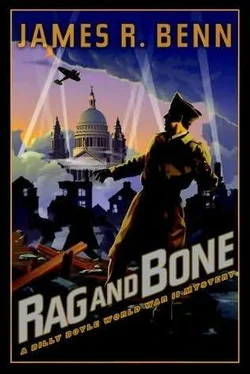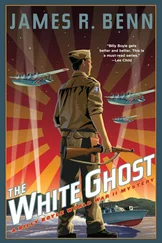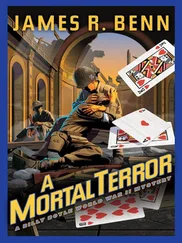James Benn - Rag and Bone
Здесь есть возможность читать онлайн «James Benn - Rag and Bone» весь текст электронной книги совершенно бесплатно (целиком полную версию без сокращений). В некоторых случаях можно слушать аудио, скачать через торрент в формате fb2 и присутствует краткое содержание. Жанр: Шпионский детектив, на английском языке. Описание произведения, (предисловие) а так же отзывы посетителей доступны на портале библиотеки ЛибКат.
- Название:Rag and Bone
- Автор:
- Жанр:
- Год:неизвестен
- ISBN:нет данных
- Рейтинг книги:4 / 5. Голосов: 1
-
Избранное:Добавить в избранное
- Отзывы:
-
Ваша оценка:
- 80
- 1
- 2
- 3
- 4
- 5
Rag and Bone: краткое содержание, описание и аннотация
Предлагаем к чтению аннотацию, описание, краткое содержание или предисловие (зависит от того, что написал сам автор книги «Rag and Bone»). Если вы не нашли необходимую информацию о книге — напишите в комментариях, мы постараемся отыскать её.
Rag and Bone — читать онлайн бесплатно полную книгу (весь текст) целиком
Ниже представлен текст книги, разбитый по страницам. Система сохранения места последней прочитанной страницы, позволяет с удобством читать онлайн бесплатно книгу «Rag and Bone», без необходимости каждый раз заново искать на чём Вы остановились. Поставьте закладку, и сможете в любой момент перейти на страницу, на которой закончили чтение.
Интервал:
Закладка:
Next, we’re in a castle. The music is different, more harsh and primitive. I glance at Kaz, and there’s a hard look on his face, as if he’s angry at what he’s seeing, so I don’t bother to ask him what’s going on. The guys in the castle are singing and dancing, whooping it up over something. I can tell these are the bad guys, by the sneers on their faces, dark, hooded eyes, and ominous lighting. Then the music kicks off into what sounds like a polka, and I know why Kaz has that look. The bad guys are Poles.
A messenger enters and sings out some news that gets everyone in an uproar. They pound fists on the table and look like they’re getting ready for trouble. So does Kaz, and I wonder when the intermission is. Not yet. We go to a humble peasant cabin in the woods. Ivan Susanin, the old Russian woodsman, sings some more, and the screen fades to a shot of a young noble boy being presented with a crown. Then I get it. The boy is the new czar, and the Poles don’t like it. Ivan is getting all weepy over the czar taking the throne, so it must be a big deal.
Ivan’s family gathers around him-his son and daughter, plus the soldier she wants to marry. He gives them his blessing, which is pretty clear from the smiles on their faces. I think it’s got something to do with the czar. Maybe no czar, no wedding? Ivan is crazy for the czar, that much is clear. They all sing more than is necessary, especially the son, until a troop of Poles burst on the scene. Bad guys again, with the sneers and leers. They point at Ivan and his family, and the image cuts away to the young czar, hidden in a monastery. Seems the Poles are on the trail of the czar. Maybe Ivan and company know where he is?
More singing, and I wonder how much they have to say. I’m following the plot and I don’t understand a single word. Ivan takes his son aside and tells him something, in a singing stage whisper. The son scoots out the door, and I figure he’s going to warn the boy czar. Then Ivan does some business with the Poles. Money changes hands, and as his daughter weeps, he leaves with them. What’s he up to?
A single Russian word appeared on the screen that had to mean intermission, and I hoped the opera was more than half over. The projector pulled the film through and the screen went white as the lights came on. Coughs and rustling sounds filled the air as people got up. Kaz was rigid, his fists clenched on his knees.
“This is an insult.” Each word loud, spit out between clenched teeth. “An insult!” Kaz stood, kicking his chair back into a couple of admirals who were making their way back to the booze.
“Lieutenant Kazimierz,” Harding said. “At ease. We are guests here.”
“You invited me here to see this?” Kaz said to Sidorov, pointing at the screen and ignoring Harding as he pushed by me to get closer to our host. “I did not recognize the name of this cleansed Soviet version, but this is A Life for the Czar, a fervent anti-Polish piece of propaganda.”
“Lieutenant, this is the first authentic Russian opera. I thought someone with your refined tastes would find it interesting,” Sidorov said, his hands outstretched at his sides, palms up, as if bewildered at Kaz’s reaction, as a crowd gathered to listen. “Yes, the czarist elements have been revised somewhat, but it is still the same opera. Just a harmless entertainment.”
“Interesting? Harmless? Only a Russian butcher would describe killing Poles as entertainment!” Kaz’s face was red, and he pushed by Harding, advancing on Sidorov, who stood motionless, waiting.
“Hold, Lieutenant!” Cosgrove boomed out, his loud mouth used to good purpose for once. “Do not embarrass yourself or your uniform.”
Kaz stood, trembling with rage, unwilling to push Cosgrove out of his way. “You’ll pay for this, Sidorov. I’ll see to that, God help me.” He turned and stormed by me. As I started to follow, I felt Harding’s hand on my shoulder.
“Stay here, Boyle. We don’t want to antagonize the Russians any further. One walkout is enough. Sit.”
“But, sir,” I said, as I felt his hand push me back into my seat.
“Sit,” he repeated. “No more food or drink. When the damn film is over, we clap and leave. I don’t know what is going on here, but we’re not going to give them grounds for an incident.”
“What was that all about?” I was surprised to hear Inspector Scutt from behind us. He was dressed in a well-worn tuxedo with a winged-collar shirt that probably was the height of fashion around the turn of the century.
“Nothing but a bit of a huff between the eastern Europeans,” Cosgrove said. “Temperamental, that lot. This all happened in the early 1600s, and it’s still fresh in their memories.”
“Lieutenant Kazimierz took exception to the story line,” Harding said, glaring at Sidorov, who was deep in conversation with other guests. “
I’m surprised he was invited at all,” Scutt said, “with the Russians and Poles at each other’s throats about their border claims and the Katyn Forest affair.”
“It was a personal invitation from Kiril Sidorov,” I said. “You were invited as well, Inspector?”
“I didn’t crash the party, if that’s what you mean. Yes, I was, and since my wife enjoys the opera, I was glad to attend. Can’t say I minded the food either. I haven’t seen some of those things since before the war. Enjoy the rest of the film. Strange, very strange,” he muttered to himself as he turned away, drawn to the call of the zukuski.
It was strange. Sidorov was a smart guy. He had to figure the opera would upset Kaz or any Pole. Did he see Kaz as a fellow intellectual, expecting him to rise above the propaganda and enjoy the music? The lights flickered, and the room soon filled again.
We start off in the woods, with the soldier-did he and the girl ever get married? — singing to his men. They seem to be following the old man and the Poles. He goes on for a while, and it seems to be a morale boost of some kind. Then the scene switches to Ivan’s son, at the monastery, where he warns the Russians guarding the boy czar. He points into the woods, and I get it. The Poles are coming, the Poles are coming. They take the czar to safety, wherever that is.
Next we see Ivan, leading the Poles into the forest. Snow is blowing and they tramp farther and farther into the deep woods, where the trees are laden with snow, the branches twisted and hanging low to the ground. The Poles start to look frightened, and there is a lot of singing between them, but Ivan keeps pointing ahead, and suddenly it seems like I can understand. Just over that next hill, he’s saying, we’re almost there. Night falls, and the Poles hunker down, casting suspicious glances at the old man, who stands apart. Ivan sings a long aria, and he’s got to be saying his good-byes, to his children, his czar, his life. He’s led the Poles here, into the deep, dark forest, and they will never find their way out. Dawn comes, and as the Poles awake, a blizzard sets in along with the realization that they’ve been had. They break out the knives and kill Ivan Susanin.
Then comes the epilogue. We’re in Moscow, Red Square by the look of the buildings. The boy czar made it there safely, and everyone sings his praises. Ivan’s son and daughter and her husband look despondent. Maybe he found Ivan and the dead Poles? They have a conversation with some Russian troops, who lead them into the square. It looks like the people know what Ivan did, and the film closes with songs of triumph, the masses heralding their new boss and the hero of the hour.
The applause was loud and instantaneous. Harding and I clapped twice, out of diplomatic courtesy only, but I had to admit, it was a rousing ending. Good propaganda for the international opera crowd. The wily Russian defeating the invader, sacrificing himself for the greater good.
Читать дальшеИнтервал:
Закладка:
Похожие книги на «Rag and Bone»
Представляем Вашему вниманию похожие книги на «Rag and Bone» списком для выбора. Мы отобрали схожую по названию и смыслу литературу в надежде предоставить читателям больше вариантов отыскать новые, интересные, ещё непрочитанные произведения.
Обсуждение, отзывы о книге «Rag and Bone» и просто собственные мнения читателей. Оставьте ваши комментарии, напишите, что Вы думаете о произведении, его смысле или главных героях. Укажите что конкретно понравилось, а что нет, и почему Вы так считаете.












